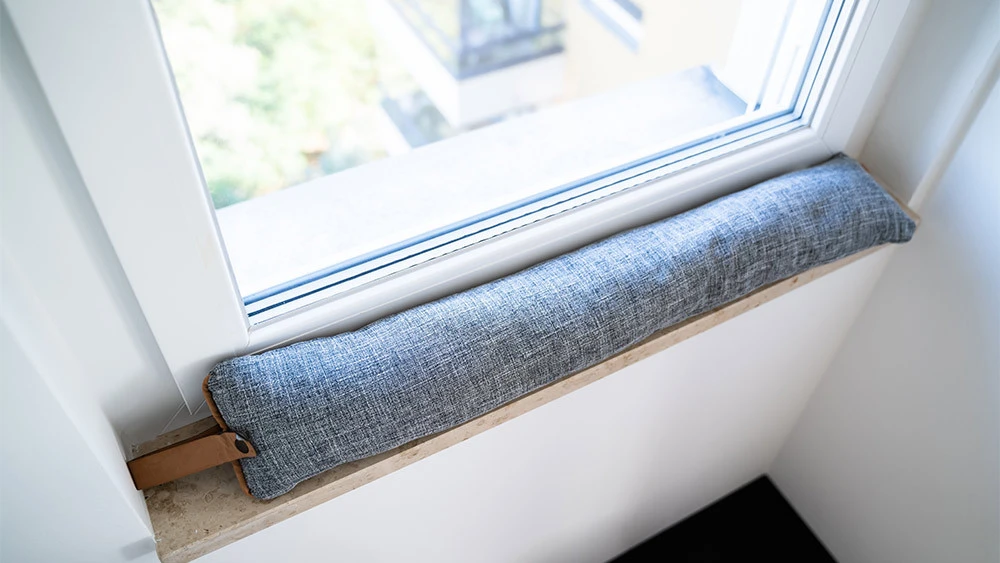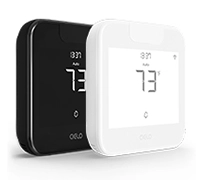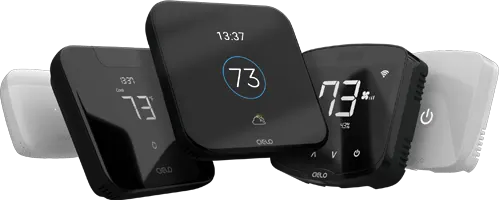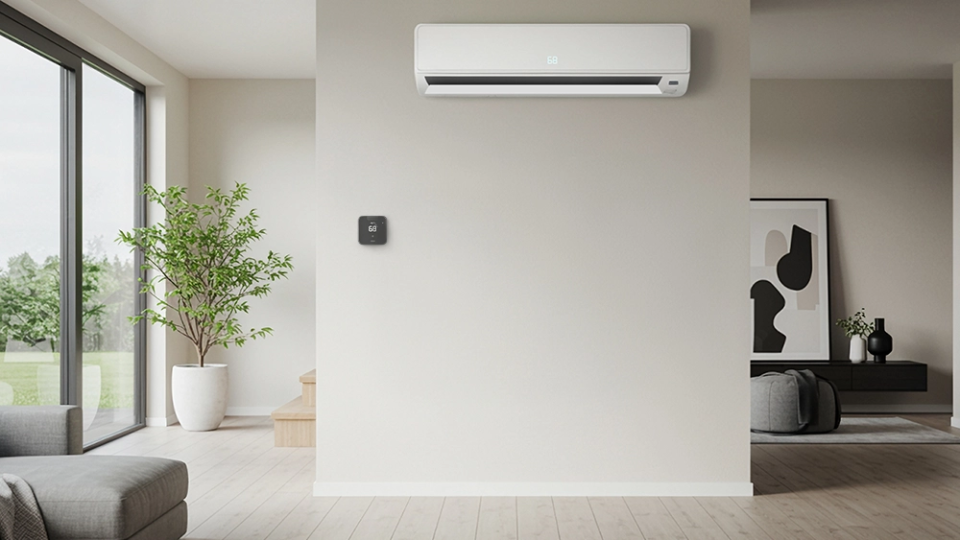
Key Takeaways
- Open curtains during the day to allow natural warmth into the room.
- Small lifestyle changes, such as layering clothes, can help you stay warm without a heater.
- Adding items like rugs and draft stoppers are effective at maintaining warmth.
With snowstorms and frosty temperatures, you shift your activities indoors for warmth and comfort. But what to do if you live in an old house that lacks a proper heating system? Or you might want to reduce your heating use due to high energy bills.
In either case, it’s essential to learn how to warm up your room without a heater before you’re caught in an emergency situation.
Let’s look at 19 valuable tips to help you keep your space as toasty as possible.
- 1. Switch to Smart Heating
- 2. Harness the Power of the Sun
- 3. Use Curtains to Retain Warmth
- 4. Weatherize Your Windows
- 5. Turn Everyday Cooking Into Extra Heat
- 6. Use a Hot Water Bottle
- 7. Utilize the Shower Steam
- 8. Layer Your Clothing
- 9. Warm Up Your Bedding
- 10. Add a Floor Rug
- 11. Use Draft Stoppers
- 12. Focus on Insulation
- 13. Inspect Your Roof
- 14. Use a Humidifier
- 15. Seal the Air Leaks Around Electrical Outlets
- 16. Reverse the Direction of Your Ceiling Fan
- 17. Move Your Bed Away from Windows
- 19. DIY Your Own Heater
1. Switch to Smart Heating

If you’re looking for ways to stay warm without a heater just because of the high electricity bills, then shifting to smart heating would solve your problem.
You can use a smart thermostat for a mini-split if you own a room unit, or a smart thermostat for a central system. These smart devices give you greater control over your room’s climate and help ensure you’re not running your unit unnecessarily. For example, if you forget to turn your unit off before leaving, it will automatically lower your thermostat via geofencing.
Equip your HVAC system with smart features and achieve the perfect balance between comfort & savings.
Learn more
Kee your house between 68°F and 70°F when you are home and automatically lower it using schedules at night or when you are away. This can help you save up to 10% on your heating bills. For added convenience, you can control your system remotely via your smartphone and adjust settings as needed.
Smart thermostats also track your energy usage, showing daily, weekly, and monthly usage patterns in the app. This allows you to make informed adjustments to reduce energy costs. By the optimal usage of these smart features, mini-split thermostats like Cielo Breez Max can help reduce heating bills by up to 25%.
Your best choice to make any mini-split, window,
or portable AC smart. Enhance your comfort and savings.

2. Harness the Power of the Sun
One natural way to stay warm without heat is to open the curtains and blinds first thing in the morning. The bright sunlight will help warm up your room in the cold weather.
The natural vitamin D from the sun rays will also help counter winter blues and lift your mood. Plus, the UV light from the sun kills most of the harmful germs and improves indoor air quality.
To maximize the amount of sunlight reaching your room, trim back the tree branches and remove any other obstructions. You can close the drapes at sunset to retain the warmth accumulated during the day.
3. Use Curtains to Retain Warmth
Opening the blinds in the morning lets natural light in, which warms up your room. At night, you would want to retain that heat as much as possible. Using curtains, blinds, or shades can be highly beneficial.
Thermal curtains are designed to trap air between fabric layers, creating a barrier of hot air that provides insulation. This means the outside temperature will not affect your room temperature. The blackout shades are another option that provides insulation and helps trap hot air. Thus, thermal curtains or shades can help keep your room warm without a heater.
4. Weatherize Your Windows
Cold drafts through gaps and cracks in windows can significantly affect room temperature. Insulating your windows is the best solution in frigid temperatures. You can seal all the air leaks with caulking. Next, apply weatherstripping between the window frame and sash to prevent cold air from seeping in. To increase your window’s ability to retain heat, try covering it with a window film. In the end, hang curtains or draperies to minimize further heat loss.
5. Turn Everyday Cooking Into Extra Heat
Cooking or baking not only adds a nice aroma to your home but also radiates heat to the surrounding rooms. After you’re done baking, turn off your oven but leave its door open. The hot air spreads in the nearby area, giving off a toasty feeling. The hot steam from boiling water or pasta can also help warm up your room without a heater.
Note: If you have children or pets at home, do not leave the oven door open unattended. Never turn on your stove or oven solely to heat your home. Gas appliances can produce carbon monoxide, which be potentially fatal.
6. Use a Hot Water Bottle
Thinking of how to stay warm without heat? Well, you can use a hot water bottle under the sheets when it’s time for bed to have a comfortable sleep. Even when you are doing some office work or reading a book, you can keep a hot water bottle with you, as it will keep on radiating warmth for quite some time.
7. Utilize the Shower Steam
If it’s possible, try keeping the door open while taking a shower. This will transfer heat from the hot shower and help to warm up your room without a heater. Additionally, it will increase humidity, making the air less dry and more comfortable.
8. Layer Your Clothing

When you don’t have heating equipment, you can focus on keeping yourself warm by layering on clothes. Use a thermal base layer, then wear an insulating layer, such as a sweatshirt or hoodie, as the middle layer. You can wear fleece, wool, or cotton clothing as the outer layer. As heat is lost through your hands and feet, slip on thick socks and add on warm mittens. Top everything off with a woolen cap.
9. Warm Up Your Bedding
Have you ever thought about blow-drying your sheets? Probably not. It’s an uncommon tip but nevertheless quite functional.
The short bursts of hot air from your dryer can quickly warm up the sheets. You can do this every night before going to bed. Just make sure to remove it safely, use the equipment, and unplug it after use. You can also try a bed heater designed to blow air under the sheets, but it can be an expensive option.
Also, invest in a high-quality blanket to retain warmth. Choose a down-filled blanket to trap heat, or use an electric blanket. Make sure to follow the safety tips with electric bedding.
10. Add a Floor Rug
In addition to serving as a statement piece in your room, a floor rug can help prevent heat loss through the floor in winter. It can add underfoot warmth to tile, wood, or concrete floors, providing a warmer surface for sitting or walking.
When choosing an area rug for your room, consider its size and depth. A thicker and larger rug provides more protection against the cold. A loosely woven rug will have more space in between and won’t offer enough protection, so go for the one with a high stitch count.
11. Use Draft Stoppers

A draft stopper, also known as a draft blocker, is a thick material that acts as a barrier between the outside and inside. When the weather gets chilly, you can use a draft stopper at the bottom of the window frame. You can also place them under your room doors to prevent drafts caused by air exchange with the outside.
You can roll a thick towel and use it as a draft blocker, or you can buy a specially designed one; it’s totally up to you. However, a dedicated one will keep your room neat.
12. Focus on Insulation
When it comes to heat, a surprising amount is lost through the gaps or cracks in your roof, walls, windows, and doors. However, you can minimize this loss by focusing on home insulation.
Identify air leaks around your room and use caulking to fill them up. You can use different types of insulation, such as spray foam insulation to fill in the wall’s cavities and foam board insulation for the floor and ceiling. Seal any openings in your room’s exterior wall with expanding foam to prevent cold air from seeping in.
13. Inspect Your Roof
Heavy snow and rain can cause damage to your roof. This allows cold air to infiltrate your room through roof leaks, lowering your room temperature.
Inspect your roof and check if any shingles are broken. You can repair the damaged shingles by applying roofing sealant underneath the cracks. If any shingles are missing, then you will have to start looking for a new roof.
14. Use a Humidifier

Warm air holds more moisture than cold air, so naturally, the humidity levels go down in the winter months. Having dry, cold air in your room can be uncomfortable, especially if you have allergies or asthma. A humidifier is a simple yet powerful solution. It adds moisture to the air and helps combat dry winter air in your house.
15. Seal the Air Leaks Around Electrical Outlets
Have you noticed a cold chill while plugging in your appliances? You may be unknowingly allowing drafts to enter your room, affecting the room temperature. The culprit is your electrical outlets.
Use an outlet insulator – it is a foam sheet that you can place behind the outlet plate to block the drafts.
16. Reverse the Direction of Your Ceiling Fan
Your ceiling fan runs counterclockwise in summer to push the cool air downward and create a chilly effect.
Your ceiling fan typically runs counterclockwise in the summer to push cool air downward and create a wind-chill effect. room. In winter, its direction can be reversed clockwise so that it pushes the warm air into the room. Most fans come with a switch at the base that you can use to change their direction.
17. Move Your Bed Away from Windows
Rearranging your room’s furniture to warm it up might not make sense, but there’s a logical explanation.
The window glass cools at night, resulting in cold air near the window. If your bed is next to the window, you may feel cold, which can affect your sleep. Plus, if your windows are not insulated, incoming cold drafts will further exacerbate the issue. Try shifting your bed in the opposite direction, away from the windows, to stay warm without heat.
18. Use Passive Solar Heating
Passive solar heating uses sunlight to naturally warm your home without relying on complex mechanical systems. It works by allowing the sun’s rays to enter the home through south-facing windows. The heat is then captured by high-mass materials such as concrete or brick. It absorbs heat during the day and slowly releases it as temperatures drop at night.
19. DIY Your Own Heater
When you don’t have an electric or gas heating system, you can DIY your own heater to make your room warm and cozy.
A simple terracotta heater can work; you just need some candles and a clay pot to start heating your home. If that’s not an option, you can also try an alcohol heater made with isopropyl alcohol, a metal can, and tissue rolls.
Another option is a DIY solar heater that uses the sun’s natural energy to warm up your room. Creating this one will require some time and effort, so keep that in mind. Keep these heaters out of the reach of children and pets and follow all the heating safety tips.
In Conclusion
Warming your room without a heater can be challenging, but measures such as sealing air leaks to prevent drafts, letting in sunlight, and using thermal curtains to retain heat can be highly beneficial. Moreover, in cold weather, switch to smart heating to maintain comfort and reduce heating costs.








